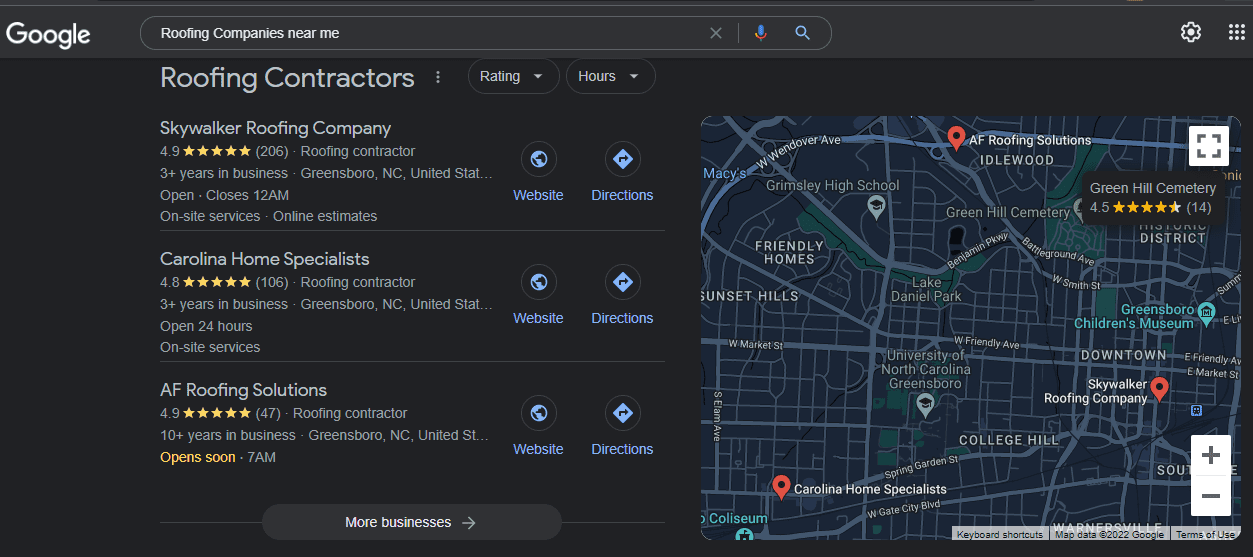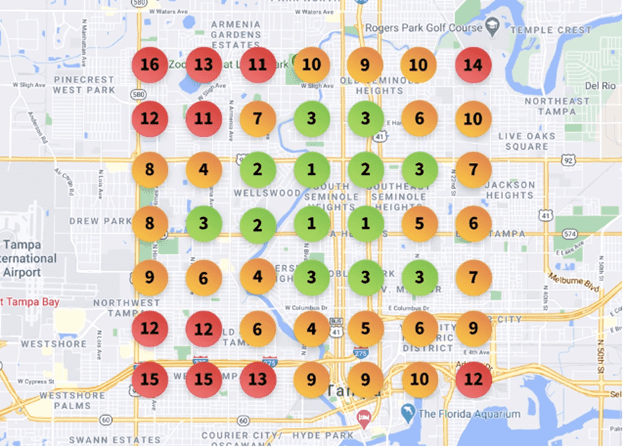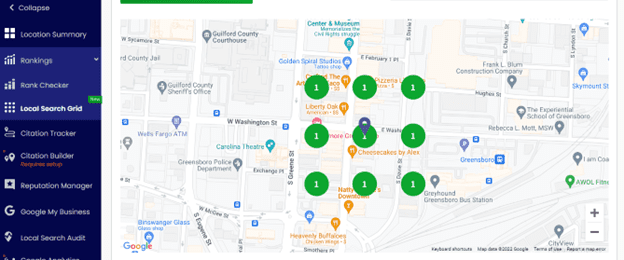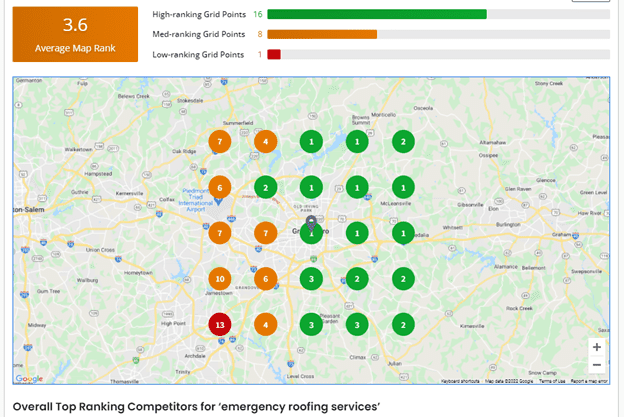How to Leverage Local Search Grid to Help
Put Your Business on the Google Map
Is your current rank tracking tool giving you a truly complete view of your local search performance?
If you’re really not sure – or if you’ve simply never thought to ask the question before – then Local Search Grid is a local SEO tool that could provide you with some valuable insights.
As an SEO professional, you always want to see your clients show up well in local map rankings. And if you’re a business owner or business leader, you certainly want your name to show up at the top of a “near me” search!
For example, if you perform a local keyword search on Google for “roofers near me,” you’ll usuallly see the top 3 text results pop up, along with a map that features some location pin results like this:
But the thing about location-based search results like this, is how widely they can vary based upon a number of factors. If someone who’s just a mile away from you performed the same search, they could end up seeing a very different map. Why is this? Part of it is attributable to the fact that Google’s algorithm is always evolving. The search engine makes a point to note a user’s specific current location and other relevant data before deciding which results to display for a local keyword search.
If you’re someone who already follows an established SEO strategy for getting your business ranked, you could track any number of location-specific keywords, and everything might look fine. So you’re doing a good job, right?
Maybe yes, maybe no. It can honestly be hard to tell, if you make your assessment based on this data alone. How can you dig deeper? Once you go beyond tracking by city, and start tracking by individual neighborhood, you may get a different result. Or what if you want to expand your search to include a wider service area? That can render some much different results, as well. This is the kind of data you won’t always get from a typical rank tracker.
To that end, Local Search Grid from BrightLocal can be a very helpful tool!
What Is Local Search Grid?
Local Search Grid is a rank tracker that’s built to evolve, grow, and paint a more complete picture of your local SEO performance. In particular, Local Search Grid presents your local map rankings in much more detail. You can still get a good idea of how your business is ranking in a city or town, but you can also dial down to the neighborhood and even street levels. You’ll be able to see how rankings change based on people’s point-of-search location. Why does this matter? It’s because you want people to be able to find you from wherever they are. That’s much more valuable than simply being able to rank whenever someone’s parked right in front of your office entrance.
Capturing as much search traffic as possible is the name of the SEO game, so you want to widen your search visibility to show up for as many local customers as possible whenever they’re searching for a product or service that you provide!
Benefits of Local Search Grid
- Gain better insights by getting a better picture of your search results
- Get a real-time, real-world picture of how you’re showing up in local searches
- Discover which competitors are dominating the map in certain areas
- Identify where you need to focus your efforts
- Monitor local SEO performance and progress with better clarity
- Ability to note flawed or faulty data, and then be able to flag any spam or other inaccuracies for the GMB administrators
- Create more intuitive, more comprehensive reports for marketing clients and stakeholders
Overview of Local Search Grid
Let’s take a closer look at some the features of Local Search Grid, and learn more about how this tool works. After you log in and open the dashboard, you’ll find the Local Search Grid tab among your available ranking tools. In order to get your report set up, begin by simply clicking on the “Get Started” button. Select (or input) your business and location, and then decide which keywords you want to enter. A map grid will then be generated, which radiates out from your designated location. You’ll want to check for those keywords that have the highest search volume, as well as for other keywords that are relevant to the products & services you provide. After inputting your keywords, you can then select how you want distances to be displayed (standard or metric units).
How wide of a grid would you like to create around your designated location? You can go out 5 miles, 7 miles, 10 miles, or as far as you like.
Now, let’s proceed to generate a report. You can add up to 5 email IDs, if you like. Once the report is created, you’ll see that all of your chosen keywords are included in a tab at the top.
In the example below, you’ll see average map rank is presented in a prominent box on the upper left. As you keep scrolling, you’ll note that this ranking applies for the keyword “emergency roofing services.” You’ll see that there are several #1 rankings, which is fantastic! But the beauty of this grid approach is that you can also make note of certain areas in which you aren’t ranking nearly as well.
Thanks to Local Search Grid, you can identify that there’s still lots of opportunity for you to connect with potential customers located to the west and southwest of your location. Now, what to do with this information?
With this tool and the data it provides, we can check for the performance of any keyword within any set range of distance in all directions. This will provide us with a competitive benchmark to see where we’re performing well, and where our competitors may be performing better. This valuable data can help us paint a more comprehensive picture of how and why some competitors might be outranking us in certain areas. We can also explore what their average ranking is, how many reviews they have, which categories in which they rank well, and other relevant pieces of data.
For example, if competitors are having success ranking in a category that we’re not currently using, we might consider trying to leverage that category for our benefit, as well. We may also need to seek more customer reviews, or do some other things to help boost the average star rating for our general business page. This is also a really good opportunity to look for any spam tactics that are being used by our competitors. If their name listing includes things like “roofers,” “affordable,” “reliable roofing services,” “emergency repair,” etc., it’s important to note whether those are part of the actual business name or not. If not, the competitor in question is really just engaging in keyword stuffing for the sake of boosting rankings. This is something we can flag for Google, and ask them to investigate. Google is usually pretty responsive to concerns of this nature, as they want to be intentional about returning search results that are as accurate and relevant as possible for their search engine users.
Final Thoughts About the Local Search Grid Tool
Imagine being able to go to a marketing client, potential client, or a member of your current business C-suite and say that you can offer a greater depth of local SEO performance insight than what they’ve been experiencing!
The conversation might go something like this: “You’re ranking really well in your immediate location. But look at this local grid map I’ve been able to generate. It looks like you’re really missing out on some leads and potential customers in areas X, Y, and Z. And as you know, missed leads mean fewer sales and less revenue for your (or our) company. If we can work on boosting your rankings in these areas, we can really help you to grow your business!”
To that end, you can also generate white label reports with Local Search Grid. These white label versions are ideal for taking and sharing with business owners and key business leaders.
If you’re a local business owner or leader, there’s lots you can learn by using a tool like this on your own. But the problem of what to do with this information still remains. One of the best ways to grab this opportunity by the horns is to partner with a professional digital marketing partner like Cibirix to help you get your business where you want and need it to be!
Ready to ramp up your business growth by expanding your local SEO reach? The pros at Cibirix are local SEO experts, plus we offer a full suite of digital marketing services for local businesses across America, and across the globe. We’re here to help! Connect with one of our friendly specialists today, and let’s come up with the right plan to maximize your local digital marketing footprint!
About Author

Anoop Namdev
Anoop Namdev serves as one of the lead SEO Analysts for Cibirix. He is passionate about his pursuit of SEO, local SEO, eBay advertising, and Craigslist marketing excellence for business clients. Digital media is one of Anoop’s native tongues, and he specializes in helping local businesses to expand their business online through strategic local SEO efforts. When he’s not busy strategizing, Anoop can be found in attendance at some of his favorite public events. He also likes to paint in his free time.






